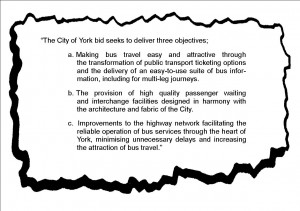The Council today is approving a bid to the Coalition Governments £50 million “Better Bus Area Fund”. It is right to do so because we do need to continue to make an investment in public transport, even in difficult economic times.
The bid is flawed because it fails to present an identifiable business case. The Council report is remarkable only is so far as it seeks to persuade government to release £2 million in funding for the City, yet it fails to identify how much is needed to fund each section of the bid.
The new Labour Council embarked on a radical new approach to providing bus services in the City when, last June, it set aside £100,000 to spend on consultants who would redesign the bus network. Another £100,000 is up for approval at the annual Council meeting on Thursday. The same meeting will consider increasing bus subsidies by £50,000. That £¼ million is likely to be small beer though when tenders to run the new network are received. All the indications are that subsidies of several millions of pounds will be required to provide the low fare, high frequency, service that some aspire to.
Separately the Council wants to introduce a paper based “through” ticket to benefit the 3% of passengers who undertake journeys in the City where they have to change bus operator.
The solution isn’t a scheme which invoices apportioning revenue manually to individual operators. That is ludicrously poor value for money with set up and running costs approaching £200,000.
The solution is to move over to smart card payment methods, a form of which has been available on Park and Ride services for some years.
The expectation was that the new generation of “touch in, touch out” charge cards would perform this function and York’s largest bus operator, First, themselves announced some months ago that they were taking that idea forward.
Next best, is a stored value or “oyster” type card. Either is worth pursuing, preferably in partnership with neighbouring Local Authorities.
It is the other aspects of the bid which will come under most scrutiny. There is talk that up to £2 million of matching funding could come from local taxpayers (apparently from the £20 million being borrowed to prop up an Economic Investment slush Fund). That is unrealistic in the present economic times.
Improving 5 bus interchange stops in the City centre are unlikely to be seen as a national priority.
The final aspect of the project will be the most controversial. It involves reserving two of the City centre bridges for public transport use. It has be talked about for a decade, so perhaps now is the time to undertake an off peak trial and monitor the consequences. Although a trial should not be expensive, a permanent restriction could well be.
It is surprising that the bid does not include the introduction of low emission buses into the City. That may be a big mistake.
Ultimately the absence of any financial figures from the Council report, means that the government’s requirements may not be met. They say, “the bid must be able to demonstrate that a sound implementation strategy is in place for each component of the proposed package of measures”. Clearly that isn’t the case in York at present.

